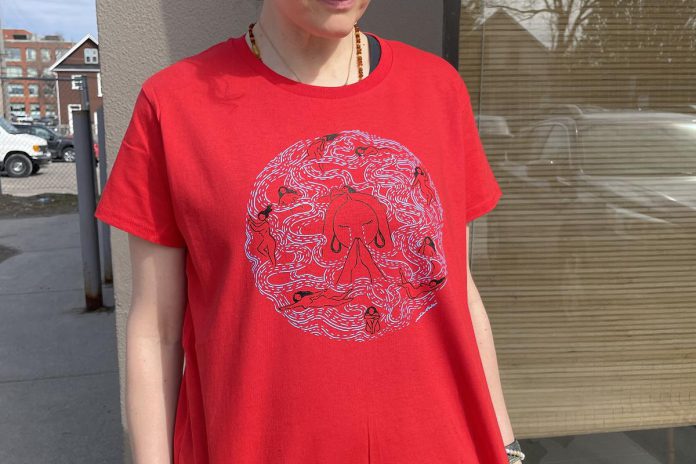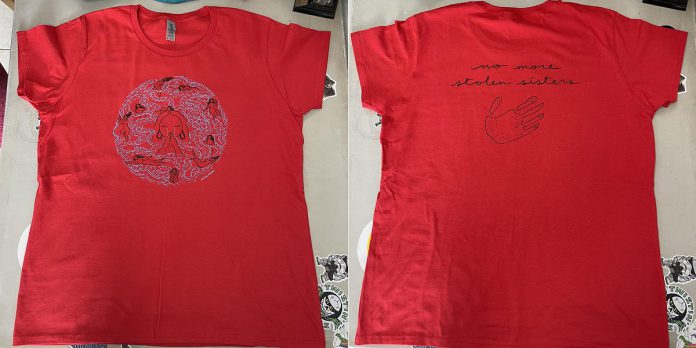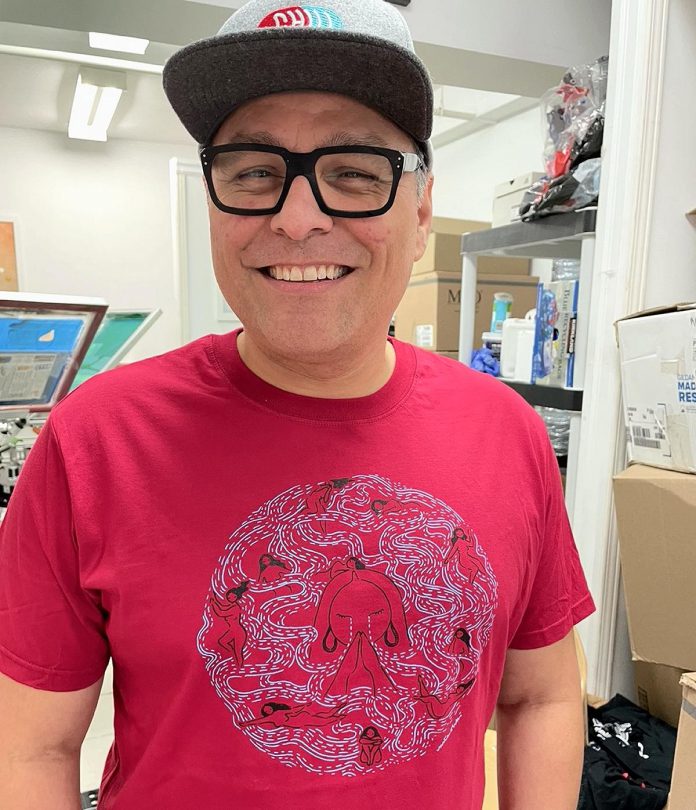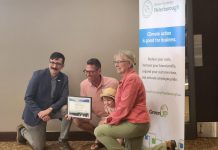
Nish Tees, an Indigenous-led business in Peterborough-Nogojiwanong, is holding a fundraiser for the National Day of Awareness for Missing and Murdered Indigenous Women, Girls, and 2-Spirit People — also known as Red Dress Day.
For the day held annually on May 5, the screen printing and design company is selling a T-shirt with a design by Mia Ohki, a Métis-Japanese Canadian artist based in Alberta. On the front, the design features an image of women swimming in tears and, on the back, the words “no more stolen sisters” above a hand print symbolizing the missing and murdered Indigenous women who have been silenced.
Proceeds from T-shirt purchases will be donated towards the YWCA Peterborough Haliburton’s Crossroads Shelter for women and children recovering from gender-based violence and Niijkiwendidaa Anishnaabekwewag Services Circle, which provides counselling and healing services for Indigenous women and their families who are at risk of violence.
This is the second year Nish Tees owner James Hodgson has decided to host the fundraiser, with last year’s event raising more than $1,100 for the Lovesick Lake Native Women’s Association.
“It’s necessary because I’m in a position to do it, and T-shirts are a really great way to generate awareness on important topics,” says Hodgson. “It’s really a great way for people to show support or create conversation and tie it to a fundraiser.”
First commemorated in 2010, Red Dress Day is meant to honour and bring awareness to the thousands of women, girls, and two-spirit people who have been subjected to disproportionate violence in Canada.
VIDEO: The REDress Project
It was inspired by Métis artist Jaime Black’s REDress Project installation, wherein she hung empty red dresses in representation of missing and murdered Indigenous women. The first installation was in March 2011 at the University of Winnipeg and, since then, the installation has been exhibited across the country as well as at the Smithsonian’s National Museum of the American Indian in Washington D.C., and is now a permanent exhibit at the Canadian Museum for Human Rights.
Though hanging red dresses in public spaces has become symbolic of a rising awareness for the national crisis, Hodgson is unsure of whether Red Dress Day has generated much change in the past 14 years.
“There’s definitely more awareness, but we’ve got to break through that envelope of awareness and get into more of an action-based, policy-making type of change,” he says. “This is what’s supposed to be happening.”
Hodgson points to the 231 individual ‘Calls for Justice’ from 2019’s Reclaiming Power and Place, the 1,000-page final report of the National Inquiry into Missing and Murdered Indigenous Women and Girls, which are directed at governments, institutions, social service providers, industries, and all Canadians. According to an analysis from CBC News, as of June 2023, only two of the Calls for Justice have been completed and more than half haven’t even been started.
“I’d really like to see some sort of identifiable and tangible things shift in our community and it’s a really difficult thing to address, because we’re not talking about an individual mindset — we’re talking about a communal mindset,” Hodgson says. “Even if you’re passionately against something, and you’re really into the cause of Missing and Murdered Indigenous Women, it’s not going to change anything unless we get a mass transition.”
An October 2023 report by Statistics Canada based on data between 2009 and 2021 showed that the rate of homicide against First Nations, Metis, and Inuit women and girls was six times higher than the rate of their non-Indigenous counterparts. Police were also less likely to lay or recommend a charge of first-degree murder (the most serious type of homicide offence) when the victim was Indigenous (27 per cent) compared to those who were not (54 per cent).

On a personal level, Hodgson points to a decision by Manitoba’s previous Progressive Conservative government not to fund the search of landfills north of Winnipeg to try recovering the remains of two Indigenous women — Morgan Harris and Marcedes Myran — who were the victims of a serial killer.
“The current colonial systems that are in place are saying that Indigenous women don’t count — that they’re garbage — and that’s infuriating to say the least,” he says. “We’ve got to do something better than that. We’ve got to show that everyone in the community has value.”
As a survivor of the Sixties Scoop — where child welfare authorities took Indigenous children from their families and communities for placement in foster homes, from which they would be adopted by white families — with his family ascending from Whitesand First Nation, Hodgson knows how imperative it is that “everyone be heard and have their problems known” so the treatment doesn’t get worse.
“I spent a lot of my life not knowing about any of these issues even though I was fully immersed in the Sixties Scoop — I didn’t know it at the time,” he says. “As an adult I’ve tried to make strides to reconnect with my home community and my birth family but a lot of them have crossed over so it’s not something I can actively pursue now.”
Hodgson also notes that many of the atrocities that we discuss when it comes to Indigenous history are not nearly as far back as we like to believe they are. While in some areas it might look like the country is making strides in the right direction, in other ways we are no closer to reconciliation.
“If you’re Indigenous, you know someone that went to residential school, either someone that survived or someone that died there,” he says, noting that the last of the residential schools in Canada closed as recently as 1996. “It’s mind-boggling that that stuff happened in the same year I went to Trent (University) to take native studies to connect in a very non-Indigenous way to some sort of Indigenous community.”

While Hodgson notes that current initiatives like the push by Leah Gazan, NDP Member of Parliament for Winnipeg Centre, for the Red Dress Alert (an Indigenous-led, 24/7 alert system thatwould operate similar to the Amber Alert by notifying the public when Indigenous women go missing) is a step in the right direction, Hodgson “doesn’t know how much of a difference it will make” if the wider public perception doesn’t change.
“Society as a whole views Indigenous women as less than human, so it doesn’t necessarily matter if they go missing and, if they do go missing, (the perpetrators) can get away with it,” he says. “There has to be some sort of response from law enforcement, from justice, from all these colonial forces. They need to be changing their opinions and attitudes towards it before there’s going to be any real change. That’s why it’s still happening.”
Since he believes it takes a lot more than raising awareness, Hodgson assures the donations from the Red Dress Day T-shirts are going to organizations that make actionable change in the community and towards the crisis such as the YWCA Crossroads Shelter and Niijkiwendidaa Anishnaabekwewag Services Circle.
“The funds that are received are going to be used directly to benefit the people that use the services,” Hodgson says, adding that these organizations are making the significant differences in the community. “There are people that are moving and shaking and trying to make positive changes at a really basic level and that is a fantastic thing, but everything is easier with a little bit of money, so we definitely try to spread some.”
And hopefully, he notes, by supporting these organizations and doing what he can, even larger change might be forthcoming.
“It’s really hard to make change in the community and have it be impactful, but I’m trying to do what I can and what I’m comfortable doing is T-shirts,” Hodgson says. “I’m trying to start those conversations with people and get the topic out there and discussing these things more because that’s how you start changing opinions.”
To buy a $25 T-shirt from Nish Tees while supporting the community, visit nishtees.ca/red-shirt-day-mmiwg2s.


























